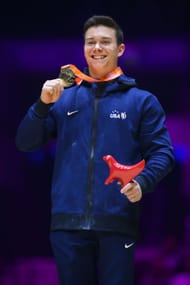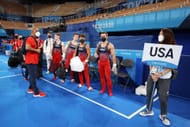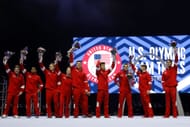USA Gymnastics, the national authority of the sport, recently announced that it has reordered the men’s senior national team after the conclusion of the Winter Cup in Louisville, Kentucky.
The new roster is made up of 15 gymnasts:
- Five gymnasts automatically qualified for the Senior National Team thanks to their top-five finishes in the all-around Winter Cupcompetition.
- A 10-point program was used to combine the results from Friday and Sunday to additionally qualify five athletes.
- University of Illinois' Ian Skirkey was selected after he met the Individual Event benchmark and;
- Brody Malone secured automatic qualification as a reigning world champion.

Based on the criteria mentioned above, this is what the reordered men's roster looks like now, according to USA Gymnastics:
- Taylor Christopulos (Layton, Utah/University of Nebraska (2)
- Asher Hong, Tomball, Texas/Stanford University (1)
- Josh Karnes (Erie, Penn./Penn State University (2)
- Ian Lasic-Ellis, Dover, Mass./Stanford University (1)
- Riley Loos, El Dorado Hills, Calif./Stanford University (2)
- Brody Malone, Aragon, Ga./Stanford University (4)
- Yul Moldauer, Arvada, Colo./5280 Gymnastics (1)
- Kameron Nelson, Evans, Ga./Ohio State University (2)
- Curran Phillips, Naperville, Ill./Stanford University (2)
- Fred Richard, Stoughton, Mass./University of Michigan (1)
- Ian Skirkey (Pepperell, Mass./University of Illinois (3)
- Blake Sun (San Antonio, Texas/Stanford University
- Donnell Whittenburg, Milwaukee, Wisc./Salto Gymnastics Center
- Khoi Young, Bowie, Md./Stanford University
- Shane Wiskus, Spring Park, Minn./EVO Gymnastics (1)
Landen Blixt will replace Josh Karnes until the 2023 US National Championships based on the all-around D score ranking from Day 1 of the Winter Cup.

Gymnastics: A spectacle of a sport
The sport was first introduced to the Olympics in 1896 but standardization only occurred at the 1928 Olympics. Gymnastics is widely divided into three different divisions: Artistic, rhythmic, and trampoline.

Since its introduction, gymnastics has become one of the most famous sports in the history of the modern Olympic games. This is largely due to the sport involving a perfect blend of grace, flexibility, and sheer strength. These attributes also enable it to successfully bridge the gap between art and sport.
In the United States, the sport enjoys a different level of popularity with athletes being observed on the national stage from a very young age. The United States (gold- 37, silver- 43, bronze- 37) currently stands as the most successful contingent in the history of the Olympics. They are followed by Japan in second place (103 total medals) and China in third (69 total medals).